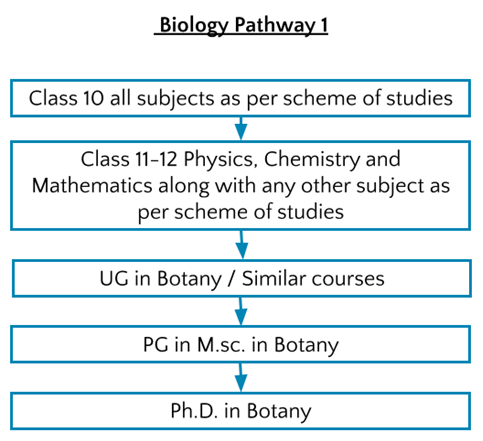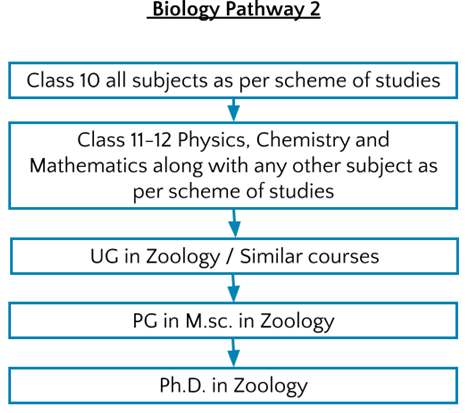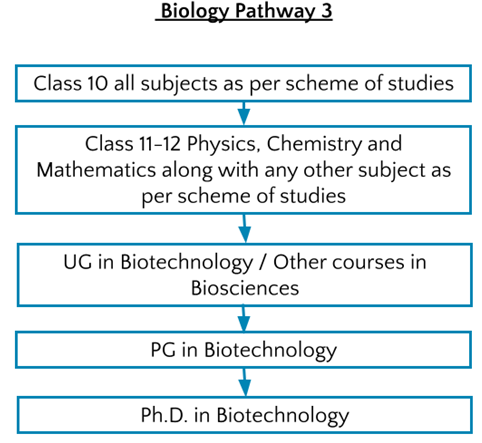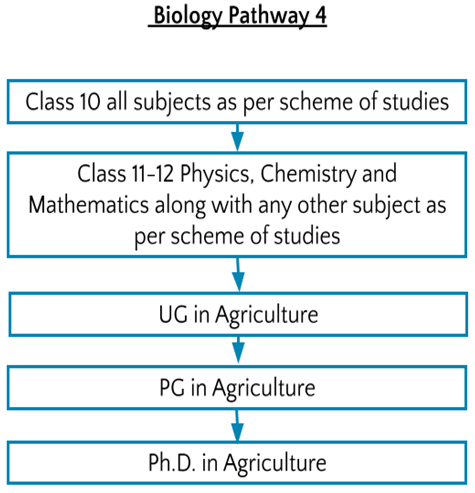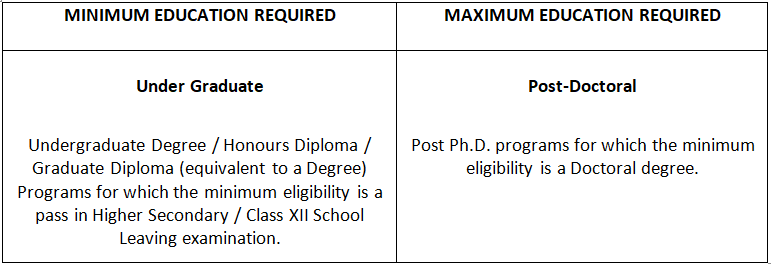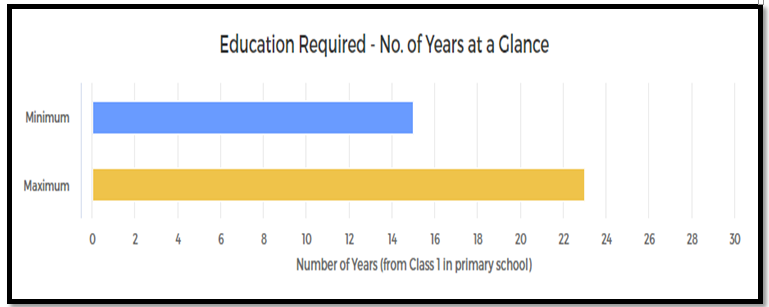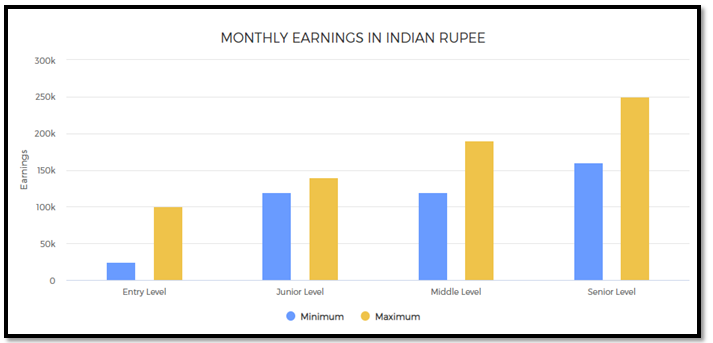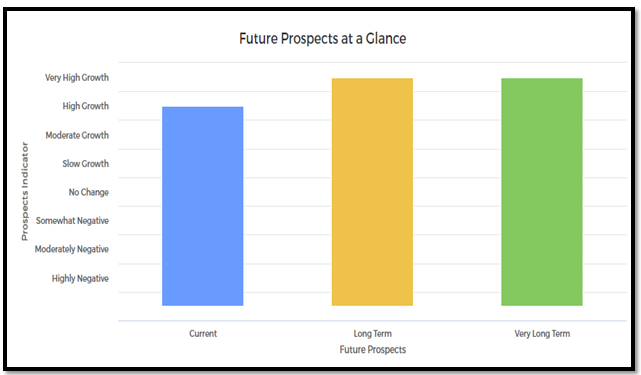Biologist / Life Scientist
Entry Level Qualification
Post Graduate
Career Fields
Agriculture & Food Science
For Specially Abled







Career Entrance Exam
About Career
Biology, simply put, is about understanding how living organisms live and work. Biology studies an organism's origin, structure, evolution, taxonomy, function, distribution and growth. Everything that has life on this earth can be studied under Biology. Most careers focus on a certain subset of Biology instead of being general about it, although attempting to do the latter is quite possible. Modern biology is a vast and eclectic field, composed of many branches and sub-disciplines.
While as a Biologist you might be working in the medical field; you would be researching new cure of diseases, working on new technologies, working on malnutrition and health etc. If you are an agriculture scientist, you would be working on ways to produce high-quality crops, how to prevent parasites from destroying crops, how to generate better varieties, etc. If you are a wildlife biologist, you might be working in ways to understand the life cycle of animals, their habitats, their breeding pattern, conservation, etc. Some of you may be in the technological field while some of you may be in the research field.
PARTICULARS | DESCRIPTION |
Name | Biologist / Life Scientist |
Purpose | Aanalyse Biological Data |
Career Field | Mathematics & Science |
Required Entrance Exam | No Entrance Exam |
Average Salary | 300000 - 400000 Rs. Per Year |
Companies For You | Biocon, Cipla, Dr. Reddy's & Many More |
Who is Eligible | Post Graduate |
Key roles and responsibilities
As a biologist, depending on your field of specialisation, you would have the following roles and responsibilities:
1. You would use a computer and programs to store, process and analyse data.
2. You would collect biological data of specimens for analysis.
3. Study characteristics of animals, plants, etc. with each other with other species.
4. You will study the reproduction, population dynamics, diseases, and movement patterns of animals.
5. You will conduct experiments on animals, plants at the micro and macro level and study them.
6. You will prepare technical reports and communicate the same with industry, government, and if needed with the general public.
7. Collect and analyse biological data about relationships among and between organisms and their environment.
8. Analyse the influence of human activities of plants and animals in their natural habitats.
9. Work on breeding programs to support the health of plants and animals, endangered species, etc.
10. You would estimate, monitor, and manage wildlife populations and invasive plants and animals
11. You would also develop and implement programs to reduce risk to human activities from wildlife and invasive species, such as keeping wildlife from impacting airport operations or livestock and crop production.
12. You would write research papers, reports and scholarly articles and explain the findings of such research.
Career Entry Pathway
Class 10 all subjects as per scheme of studies– Class 11-12 Physics, Chemistry and Mathematics along with any other subject as per scheme of studies– UG in Botany / Similar courses – PG in Botany/Plant Sciences/Similar fields – Ph.D. in Botany/Plant Science/Similar fields.
After Class 11-12 Physics, Chemistry and Mathematics along with any other subject as per scheme of studies and then study for an undergraduate degree in Botany /similar courses (Honours or specialisation is an advantage) followed by a master’s degree in Science stream in Botany/Plant Science/similar fields. After a Master’s Degree, you can take a Ph.D. in Botany/Plant Sciences/related fields.
Class 10 all subjects as per scheme of studies– Class 11-12 Physics, Chemistry and Mathematics along with any other subject as per scheme of studies– UG in Zoology / Animal Science / similar subjects – PG in Zoology/Animal Sciences/Similar fields – Ph.D. in Zoology/Animal Science/similar fields
After Class 11-12 Physics, Chemistry and Mathematics along with any other subject as per scheme of studies, you can study science stream with Physics, Chemistry & Biology in your higher secondary school and then study for an undergraduate degree in Zoology / Animal Sciences/ similar subjects (Honours or specialisation is an advantage) followed by a master’s degree in Science stream in Zoology/Animal Science/Similar field. After a Master’s Degree, you can study for a Ph.D. in Zoology/Animal Science/similar field.
Class 10 all subjects as per scheme of studies– Class 11-12 Physics, Chemistry and Mathematics along with any other subject as per scheme of studies– UG in Biotechnology /other courses in Biosciences– PG in Biotechnology/other courses in Bioscience – Ph.D. in Biotechnology/similar fields
After Class 11-12 Physics, Chemistry and Mathematics along with any other subject as per scheme of studies, you can study science stream with either Physics, Chemistry and Biology or Physics, Chemistry, Mathematics & Biology in your higher secondary school and then study for an undergraduate degree in Zoology, Botany, Biotechnology, Microbiology, Biochemistry, Biophysics, Molecular Biology, Genetics, Agricultural Science, Plant Science, Animal Science, Veterinary Science, Marine Biology, Fishery Sciences, or similar courses followed by a master’s degree in Science stream in Biotechnology. After a Master’s Degree, you can take a Ph.D. in Biotechnology/similar field.
Class 10 all subjects as per scheme of studies– Class 11-12 Physics, Chemistry and Mathematics along with any other subject as per scheme of studies– UG in Agriculture – PG in Agriculture – Ph.D. in Agriculture
After Class 11-12 Physics, Chemistry and Mathematics along with any other subject as per scheme of studies, you can study science stream with Physics, Chemistry and Biology in your higher secondary school and then study for an undergraduate degree in Agriculture followed by a master’s degree in Science stream in Agriculture. After a Master’s Degree, you can take a Ph.D. in Agriculture.
Class 10 all subjects as per scheme of studies– Class 11-12 Physics, Chemistry and Mathematics along with any other subject as per scheme of studies– UG in Biochemical Engineering / Biotechnology / similar fields – PG in Biochemical Engineering / Biotechnology / similar fields – Ph.D. in Biochemical Engineering / Biotechnology / similar fields
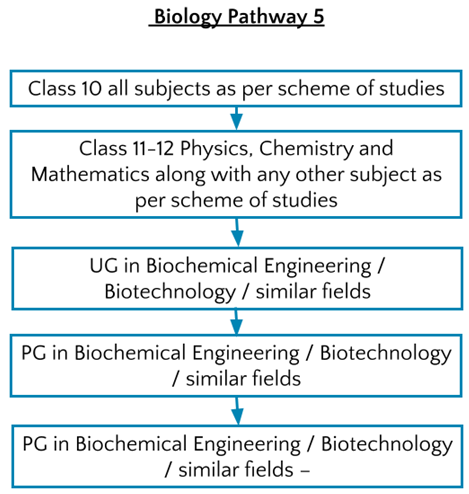
After Class 11-12 Physics, Chemistry and Mathematics along with any other subject as per scheme of studies, you can study science stream with Physics, Chemistry & Mathematics in your higher secondary school and then study for an engineering degree in Biomedical Engineering / Biotechnology Engineering / Bioengineering followed by a master’s degree in Biomedical Engineering / Biotechnology Engineering / Bioengineering. After a Master’s Degree, you can take a Ph.D. in Biomedical Engineering / Biotechnology Engineering / Bioengineering.
Required Qualification & Competencies
Undergraduate studies after school:
1. To become a Biologist, you should complete your schooling with Biology, Chemistry and Physics and join for an undergraduate course of Bachelor of Science in Botany Zoology Biotechnology Bioinformatics etc. With any combination of Chemistry Physics Environmental Science.
2. Alternatively, you can study Agriculture and Horticulture in 4 years B.Sc. course.
Post Graduate studies:
After finishing B.Sc. or B.Sc. (Hons), you can take the M.Sc. course in the various field of Biology. At this level you will study any of the following specializations like Agriculture, Horticulture, Floriculture, Bioinformatics, NanoBiology, Biotechnology, Bacteriology, Marine biology, Nematology, Mammalogy, Marine Zoology, Forestry, Virology, Microbiology, Nematology, Biopsychology, Biostatistics, Computational Biology, Ecology, Forensic Biology, Life Sciences, Cell Biology, Genetics, Molecular Biology, Marine Biology, Immunology, Phycology, Lichenology, Anthropology, etc.
Doctoral Studies:
1. The Biologist is a specialised scientist, and thus research becomes an important part of the pathway. Thus, after completing Post Graduate Studies, you can choose to take a Ph.D. in Agriculture, Zoology, Botany, etc. in following disciplines Agriculture, Horticulture, Floriculture, Bioinformatics, NanoBiology, Biotechnology, Bacteriology, Marine biology, Nematology, Mammalogy, Marine Zoology, Forestry, Virology, Microbiology, Nematology, Biopsychology, Biostatistics, Computational Biology, Ecology, Forensic Biology, Life Sciences, Cell Biology, Genetics, Molecular Biology, Marine Biology, Immunology, Phycology, Lichenology, Anthropology, etc.
2. Alternatively, you can also take an M.Phil. Course in Botany, Zoology or Bioinformatics after completing a master degree and then take Ph.D.
Compentencies Required
You should have the following occupational interests:
1. Investigative - You should have interests for Investigative Occupations. Investigative occupations involve working with ideas and quite a lot of thinking, often abstract or conceptual thinking. These involve learning about facts and figures; involve the use of data analysis, assessment of situations, decision making and problem-solving.
2. Realistic - You should have interests for Realistic Occupations. Realistic occupations involve more practical and hands-on activities than paperwork or office work. Realistic occupations often involve physical activities for getting things done using various tools and equipment.
Following personality attributes are required:
1. You are always or mostly organised in your day-to-day life and activities.
2. You are always or mostly disciplined in your action and behaviour.
3. You are always practical or in most situations.
You should have the following skills and knowledge:
1. Reading Comprehension - Skills in understanding written sentences and paragraphs in work related documents.
2. Critical Thinking - Skills in the analysis of complex situations, using logic and reasoning to understand the situations and take appropriate actions or make interpretations and inferences.
3. Active Listening - Giving full attention to what other people are saying, understanding the points being made by others, asking questions, etc.
4. Scientific - Skills in using various scientific rules and methods to get things done or solve problems.
5. Biological Science - Knowledge of plants and animals, their anatomical structure, cell structure, tissues, physiological functions, evolution, and all other related aspects.
6. Chemical Science - Knowledge of the chemical composition, structure, and properties of substances and of the chemical processes and transformations that they undergo. This includes uses of chemicals and their interactions, toxicity, production techniques, and disposal methods.
You should have the following aptitudes and abilities:
1. Oral Comprehension - The ability to listen to and understand information and ideas presented through spoken words and sentences.
2. Inductive Reasoning - The ability to combine pieces of information from various sources, concepts, and theories to form general rules or conclusions. For example, analysing various events or situations to come out with a set of rules or conclusions.
3. Oral Expression - The ability to communicate information and ideas in speaking so others will understand.
4. Deductive Reasoning - The ability to apply general rules and common logic to specific problems to produce answers that are logical and make sense. For example, understanding the reasons behind an event or a situation using general rules and common logic.
5. Category Flexibility - The ability to generate or use different sets of rules for combining or grouping things in different ways.
Career - Job Opportunities & Profiles
1. As a Biologist, there are four major career opportunities for you, i.e. academic institutes, laboratories, pharmaceutical companies and private industries.
2. Most of the universities and college will hire you as a professor at the position of Junior Professor or Assistant Professor. If you are into research, then you will be hired at the position of research associate.
3. Research laboratories will hire you as a scientist/scientist officer with the lowest grade.
4. Private Industries and pharmaceutical organisations will hire you are a controller, Research Scientist, Technical Consultant, etc.
You can find job opportunities at the following organisations:
1. Agricultural Research institutions
2. Companies producing biotechnology products like Biocon.
3. Pharmaceutical Organizations like Cipla, Dr. Reddy's, etc.
4. Food Institutes
5. National Parks and Wildlife Sanctuaries
6. Medical Research Institutes like Institute for Stem Cell Science and Regenerative Medicine.
7. Research institutes like Wildlife Institute of India.
8. Institutes of scientific learning like IISc, IIA, RRI, TIFR, etc.
9. Biology and related department of all colleges.
10. Research centres and laboratories like National Centre for Cell Science.
11. Fertiliser Plants
12. Hospitals
Work Environment
As a biologist, if you are off the field, you would be required to spend most of your working time in laboratories, while most of them will be small and safe. You would need to wear gloves, lab coats to keep a distance from any pathogen or parasite. If you are in the field, you might be required to go underwater, in the jungle, in the desert, on the mountains to research about the life science there. The on-field jobs can be challenging in terms of climate, harsh habitat, danger from animals, etc. Most of the work will need patience as experiments and work tend to take time to deliver results.
Specialisation Tracks In This Career
Geneticist
Geneticists study genes and their structure. Genes are the carriers of heredity and components of DNA inside chromosomes. If you have a similarity with your parents, it is because your parents passed that trait to you through genes. Geneticists study these genes and work on genetic processes and develop technologies to help in medicine and agriculture.
Neuroscientist/Neurobiologist
A Neuroscientist studies the physiological, biochemical, anatomical and molecular aspect of neurons and neural circuits. They study how neurons and neural circuits are associated with learning and association. They mostly study and focus on research nervous system.
Developmental Biologist
Developmental Biologists study the process of growth in plants and animals. They study how regeneration, reproduction, asexual and sexual reproduction, and metamorphosis help the growth.
Biochemist
Biochemists study the biochemical processes happening in the living cells and organisms. They form an important link in studies of living cells as biochemical reactions exist in all life forms. They study the reaction, structure, function, etc. of biological molecules.
Molecular Biologist
Molecular Biologists study, research, and experiment on the molecular and cellular structure of cells to understand how cells function. They study DNA sequencing, cloning, RNA, etc.
Microbiologist
Microbiologist studies microorganisms like unicellular bacteria, multicellular cell colonies, a cellular (lacking cells). They study bacteria, virus, parasites, etc. in terms of biology and life science. They also study the commercial use of microorganisms in industrial fermentation, industrial production, etc.
Physiologist
Physiologists study the life functions of organisations (both plant and animal) at the organism level, cellular level and molecular level. They study growth, reproduction, photosynthesis, respiration, movement, and other physiological functions of organisms.
Computational Biologist
Computational Biologists develop, use and apply data analysis methods, computational methods, mathematical knowledge and models, computational simulation techniques, etc. to biological studies. They might use biological data to use and develop models or algorithms to understand biological systems.
Zoologist
Zoologists study the animal's kingdom and about the evolution, structure, classification, habits, reproduction, distribution, extinction, etc. They study how animals spread; species differentiate, habitats help them grow, etc.
Botanist
Botanists study the life of plants and plant kingdom. They study the evolution, classification, reproduction, photosynthesis, distribution, etc. of plants.
Ecologist
Ecologists study the relationship between living organisms and their environment. They study biodiversity, distribution, biomass, habitation, etc.
Nanobiologist
Nanobiologist is the scientist who combines the tools, ideas, and materials of nanoscience and biology. It is an emerging field where scientists are working to come up with new medical solutions using biology, materials science, physics, and chemistry.
Stem Cell Researcher
Stem Cell researchers work on the stem cell, creating new medical solutions and therapies. Stem cells can change into any body cell, and they can also divide to form new similar stem cells. These properties make them very important in the medical field. Thus scientist uses them to create new ways to inject life in different body parts. Bone marrow transplantation is one such technique of using stem cells.
Career Growth
1. The career growth in university and college states from Assistant Professor and then Associate Professor, Professor and Professor Emeritus. Professors can also get administrative positions such as Director/Dean/Vice Chancellor, etc..
2. Research laboratories will hire you as a scientist/scientist officer with the lowest grade and the grade changes from low to high. In India, grades are “Scientist “C” as the joining level and then D, E, F, G, H and finally DS. A senior-level scientist can also get into administrative positions like Principal Scientist, Assistant Director, Deputy Director, Director, etc
3. If you join a private organisation, pharmaceutical companies as a research scientist, then you will move to senior research scientist and principal scientist with work experience.
Salary Offered
1. At the entry level, you can join as a research associate with a basic salary of 25,000 INR to 30,000 INR. As a doctoral research fellow (junior research fellow) you would be earning around 35,000 INR to 38,000 INR per month. At the entry level, as a Scientist (grade C) you would be earning around 80,000 to 100,000 INR per month. As an assistant professor, you would be earning anything between 65,000 INR to 70,000 INR per month. All these salaries are inclusive of some allowances
2. At the junior level with a work experience of 2-6 years, you would be earning anything between 1, 20,000 INR to 1, 40,000 INR per month.
3. At the junior level with a work experience of 2-6 years, you would be earning anything between 1, 20,000 INR to 1, 40,000 INR per month.
4. At the middle level with an experience of 10-12 years, you would be earning anything between 1, 40,000 to 1, 90,000 INR per month as a scientist and 1, 20,000 INR to 1, 60,000 INR as a professor.
5. At the senior level of over 15 years of work experience, you would be earning anything between 1, 60,000 to 2, 00,000 INR per month as a professor and 2, 10,000 to 2, 50,000 INR per month as a Scientist.
Monthly Earnings In Indian Rupee
1. Entry level: 0 - 2 years of work experience
2. Junior Level: From 1 to 12 years of work experience
3. Mid-Level: From 5 to 20+ years of work experience
4. Senior Level: From 10 to 25+ years of work experience (there could be exceptions in some high-end technical, financial, engineering, creative, management, sports, and other careers; also in the near future, people will reach these levels much faster in many careers and in some careers, these levels will have no meaning as those careers will be completely tech skill driven such as even now, there is almost no level in a Cyber Security Expert’s job)
Work Activities
As a Biologist, you might be involved in various applied and theocratical areas of Biology. In these areas, you might be involved in different activities such as:
1. Working with computers, programming and performing technical tasks- Using computers for day-to-day office work; using computer software for various applications in day-to-day professional work; entering data and process information; for writing.
2. Analysis and interpretation of data and information - Analysis of data and information to find facts, trends, reasons behind situations, etc.; interpretation of data to aid in decision making.
3. Information processing - Searching, compiling, tabulating, calculating, auditing, verifying or otherwise dealing with information processing including data entry, transcription, recording, storing and maintaining databases.
4. Updating & using relevant information - Keeping updated with the latest knowledge relevant to your fields of work and use of the relevant knowledge in getting things done.
Future Prospects
As per the budget, Indian spending on R&D has been stagnant at 0.7%- 0.8% of GDP for the past 20 years. This is much lower than in other developing nations. This opens up a potential for further investments in this field to create opportunities for researchers. Apart from the jobs in some medical and pharmaceutical private players, most of the jobs in terms of Research Institutes, Research colleges, Research organisations are Government owned. You can also venture out outside India and study in countries like USA, UK and Australia. It is possible to get a job in academics or in industry outside India. Biology is a field for the future. A lot of research and development possibilities are there.
Future Prospects At a Glance


